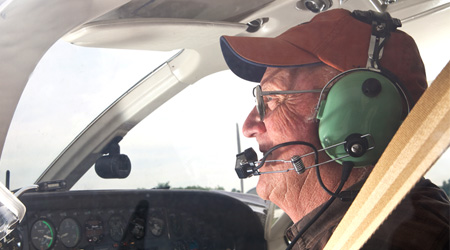 How pilots, getting along in years, can maintain their medical and continue their passion.
How pilots, getting along in years, can maintain their medical and continue their passion.
New Zealand has an ageing population, and that also means ageing pilots.
In fact, the average age of New Zealand pilots, both aeroplane and helicopter, has increased from 38 to 42 in the last ten years, with a number of pilots well into their seventies.
Further, the growth in demand for commercial pilots has resulted in pilots retiring later.
Vector asked CAA Acting Principal Medical Officer Dr Claude Preitner, himself a senior pilot, what sort of changes the ageing pilot can expect.
“Changes can include those to vision, hearing, strength, and a pilot’s range of movement. It can affect posture and balance, sleep regulation, and thermoregulation. Decline in mental function is of particular concern. Together these changes may affect pilot performance.
“But it can be hard for some pilots to recognise decline, as it’s often very gradual.
“It may also be difficult for someone to accept that they’re no longer 'Maverick', and that their health and performance have declined enough to negatively affect the safety of their cherished activity.”
Insufficient evidence

Photo: iStock.com/ImageegamI
“The statistical relationship between age, decline, and accidents is not clear,” says Claude. “With proper medical screening, sudden incapacitation of an older pilot remains unlikely. But if the unlikely should happen, it would be mitigated by the presence of a second pilot, say, in the case of airline operations.
The Aircraft Owners and Pilots Association – AOPA – found its review1 of studies of elder pilot safety was inconclusive, saying “…perhaps most striking is the relative absence of exact findings”.
The Aerospace Medical Association also says their review concluded there’s insufficient medical evidence to support “restriction of pilot certification based on age alone”.
Claude agrees, saying chronological age isn’t a very good lens to assess a pilot’s ability to operate safely.
“Everyone ages differently, so it would be difficult to decide on such an age limit.”
The critical role of currency
While chronological age might not be a hard and fast end to a pilot’s flying days, it does appear to impact on safety if the pilot lacks currency, according to Claude.
“Currency is probably the most important thing for the older pilot.”
The AOPA research backs this. It discovered that, while low-currency older pilots have more accidents than low-currency younger pilots, high-currency older pilots have fewer accidents than their younger counterparts.
Eighty-five year old pilot Guy Clapshaw believes that’s because experience compensates for age.
“This is especially true, I think, for IFR-rated pilots flying on instruments or in adverse weather.
“In terms of the effects of ageing on pilot safety, the CAA medical sorts out anything not reaching the standard, especially with hearing, eyesight, and heart.”
Guy says his age has not affected his flying ability, although he does take a bit longer to get into his Percival Proctor these days! He stays current, and he gets regular eye checks.
“There is some wear on the eyesight and heart, but I have biennial flight reviews and there hasn’t been a problem.”
Mick Orchard began flying at 62 when he was told, “If you can still ride a bike, you can fly a plane”.
Mick built his own Glastar and knocked up 500 hours flying the length of New Zealand. However, before a planned trip over the Tasman could take place, he retired from flying to care for his wife who’d become unwell.
Now 85, Mick feels he could fly if he had to. “My heart is still strong, but you gotta look at reaction times, they’ve slowed down.
“You should know your own limitations. A lot of people don’t realise that.”
CAA Aviation Safety Advisor Carlton Campbell agrees with Mick.
“As we become an older pilot, it’s important to be open-minded to feedback from our peers, particularly our friends and families who know us well.
“They see the effect of ageing on us more clearly than we do. So listen to them, invite their feedback, take it seriously, and if appropriate, hang up the spurs with dignity rather than stubbornly hanging in there.
“It’s not always just about us – it can be an important life statement to others.
“If you want to continue to enjoy your wings but know you’re beyond flying solo, take an instructor and fly dual.”
Claude’s general advice for older pilots, other than staying current, is keeping yourself as healthy as possible.
He says age well and wisely – exercising body and brain, practising good sleep hygiene, eating well, limiting alcohol, and recognising what you can no longer do.
“And don’t hesitate to do some dual retraining.”
Advice for instructors
The instructor plays a crucial role in making sure ageing pilots are up to scratch. Claude has some general advice for them.
“They should be looking for the general ageing that pilots should be looking for in themselves – poorer eyesight and so on.”
Claude also says that instructors should adapt their teaching technique to fit their student, no matter their age.
“Have a bit of an understanding of the pilot you’re dealing with – their characteristics, how they’re ageing, and their style of learning.
“The BFR is a learning opportunity for pilots to improve their competency, and for the instructor to observe any issues, and see if any retraining is required.
“If a pilot isn’t up to scratch in the BFR, the first check should be if there’s just a currency issue. If so, the pilot should quickly recover their skills.
“However, if the pilot is slow to recover their skills, the issue may be more serious, for example, a cognitive decline. It may be time for a conversation between the instructor and the pilot.
“If an instructor has real concerns about safety, they can discuss it with an experienced colleague or a CAA flight examiner.
“As a last resort, and in the name of aviation safety, an instructor, however reluctant, may have to contact the CAA if an older pilot is clearly no longer able to fly safely but is unable to recognise it.”
Wise elders
Brendon Bourne, CAA Flight Examiner, says all aviation benefits from having older pilots staying in the system.
“There’s so much knowledge and wisdom in the brain of a pilot reaching retirement age that can be obtained only from experience.
“It’s important for the aviation community to be able to make use of this valuable resource in perpetuating aviation safety.
“So if senior pilots stay healthy, keep current, and maintain their medical, everybody wins.”
1 Aging and the General Aviation Pilot – Research and Recommendations, AOPA(external link)
